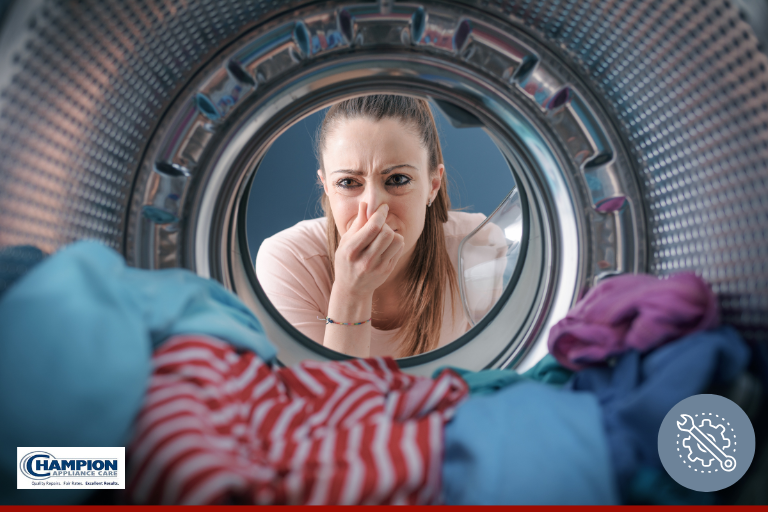Have you ever smelled a less-than-pleasant odor coming from your washing machine? You start to do a load and realize your washing machine smells like mildew or mold. If this is you, you’re not alone. A smelly washer is a common issue, but you don’t have to be stuck with it. Here are some straightforward explanations and solutions.
Afraid it may be time for washer repair? Check our article: 10 Common Signs Your Appliance Needs Repair.
8 Reasons for Smelly Washing Machine
When you use a washer, it’s often warm and damp when you’re done, right? And mildew is fed by warm, moist environments. For most things, if your washing machine smells like mildew, a good cleaning will help significantly. Let’s break down the most likely causes and what you can do about them.
1. Dirty Door Seal (For Front-Load Washers)
Front-load washers have a rubber gasket around the door. This gasket traps moisture and detergent reside, making it one of the biggest reasons for the mildew smell in this type of unit. If you see grime or black spots on the seal, you have a mold problem.
Regularly wipe down the seal with a mixture of vinegar and water. You can also leave the door open after each use to allow it to dry out.
2. Built-Up Residue in the Washer Drum
Over time, soap scum, fabric softener, detergent buildup, and even mineral deposits can accumulate inside your washer. This is the perfect breeding ground for mildew and bacteria, and leads to unpleasant smells.
The fix? Regular deep cleaning! Run an empty cycle with hot water. Use a mix of baking soda and vinegar, or a washing machine cleaner. The cleaner will break down the buildup and keep things fresh.
3. Washing With Cold Water Too Often
While cold water is great for energy savings and protecting fabrics, it doesn’t dissolve detergent and soap scum as well as hot water. This is one of the reasons for residue to build up.
Don’t worry. You don’t have to quit using cold water. Follow the cleaning schedule and wash loads like towels in warm or hot water.
4. Using Too Much Detergent
More soap doesn’t always mean cleaner clothes. Using too much detergent can leave behind residue inside the washer, trapping moisture and encouraging mildew.
Make sure you use the amount indicated on the detergent packaging to stop this from happening. If you have a high-efficiency (HE) machine, using the recommended amount is even more important.
5. Wrong Type of Detergent
Not all detergents are created equal. If you’re using a regular detergent in a high-efficiency (HE) washer, you might be causing excess suds. Too many suds mean leftover moisture, which can lead to mildew growth. Stick to HE detergents if you have an HE machine—they create fewer suds and rinse out more effectively.
6. Leaving Wet Clothes Inside Too Long
We’ve probably all forgotten a load of laundry in the washer overnight. Unfortunately, damp clothes sitting in a sealed environment for too long create the perfect conditions for mildew. To prevent this, try to remove clothes immediately after a wash cycle and leave the door open when the washer isn’t in use to help air things out.
7. A Clogged Drain Hose
A blocked or slow-draining hose can cause water to sit inside the washer, leading to unpleasant odors and mildew growth. If your washer smells bad and isn’t draining properly, the issue could be your drain hose.
Check the drain hose to see if it’s blocked or kinked. If it’s blocked, clean it out to help it drain properly.
8. A Dirty Detergent Dispenser
Did you know your detergent drawer can be a problem? If not cleaned regularly, leftover soap and moisture can lead to mold growth here. Every so often, take the drawer out, wash it with warm, soapy water, and let it dry before putting it back.
Need a Champion?
If your washing machine still smells bad despite your best efforts, it’s time to call in the professionals. Our expert team offers reliable appliance repairs for washers, dryers, refrigerators, ovens, and more. Schedule your service with the convenient form below and we’ll get your appliances back in top shape!

